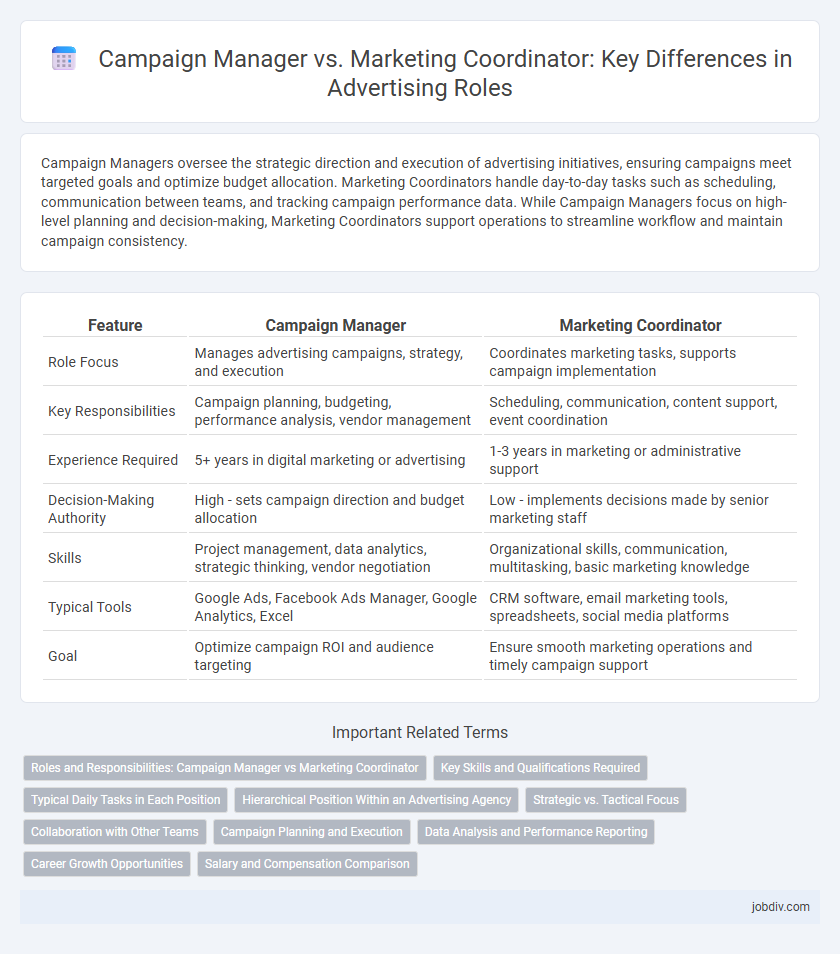Campaign Managers oversee the strategic direction and execution of advertising initiatives, ensuring campaigns meet targeted goals and optimize budget allocation. Marketing Coordinators handle day-to-day tasks such as scheduling, communication between teams, and tracking campaign performance data. While Campaign Managers focus on high-level planning and decision-making, Marketing Coordinators support operations to streamline workflow and maintain campaign consistency.
Table of Comparison
| Feature | Campaign Manager | Marketing Coordinator |
|---|---|---|
| Role Focus | Manages advertising campaigns, strategy, and execution | Coordinates marketing tasks, supports campaign implementation |
| Key Responsibilities | Campaign planning, budgeting, performance analysis, vendor management | Scheduling, communication, content support, event coordination |
| Experience Required | 5+ years in digital marketing or advertising | 1-3 years in marketing or administrative support |
| Decision-Making Authority | High - sets campaign direction and budget allocation | Low - implements decisions made by senior marketing staff |
| Skills | Project management, data analytics, strategic thinking, vendor negotiation | Organizational skills, communication, multitasking, basic marketing knowledge |
| Typical Tools | Google Ads, Facebook Ads Manager, Google Analytics, Excel | CRM software, email marketing tools, spreadsheets, social media platforms |
| Goal | Optimize campaign ROI and audience targeting | Ensure smooth marketing operations and timely campaign support |
Roles and Responsibilities: Campaign Manager vs Marketing Coordinator
Campaign Managers oversee the planning, execution, and analysis of advertising campaigns, ensuring alignment with strategic goals and optimizing performance metrics such as ROI and engagement rates. Marketing Coordinators support campaign development by managing logistics, coordinating between creative teams, and tracking project timelines to maintain workflow efficiency. The Campaign Manager drives high-level strategy and budget management, while the Marketing Coordinator focuses on operational coordination and communication across departments.
Key Skills and Qualifications Required
Campaign Managers require strong project management, strategic planning, and data analysis skills, with proficiency in digital advertising platforms such as Google Ads and Facebook Business Manager. Marketing Coordinators need excellent organizational abilities, communication skills, and familiarity with content creation and social media management tools like Hootsuite or Buffer. Both roles benefit from a bachelor's degree in marketing, communications, or business, but Campaign Managers often require more experience in campaign execution and budget management.
Typical Daily Tasks in Each Position
Campaign Managers oversee strategic planning, execution, and performance analysis of advertising campaigns, including budget allocation, media buying, and coordination with creative teams to maximize ROI. Marketing Coordinators handle logistical support for campaigns, manage content creation schedules, coordinate with vendors and internal teams, and track campaign progress through data reporting tools. Campaign Managers focus on high-level strategy and optimization, while Marketing Coordinators ensure seamless workflow and communication for campaign delivery.
Hierarchical Position Within an Advertising Agency
The Campaign Manager typically holds a higher hierarchical position within an advertising agency, overseeing the strategic planning and execution of advertising campaigns across multiple channels. The Marketing Coordinator generally operates at a more junior level, supporting the Campaign Manager by managing administrative tasks and coordinating communication between teams. This structure enables efficient campaign delivery while maintaining clear role distinctions in project leadership and operational support.
Strategic vs. Tactical Focus
Campaign Managers prioritize strategic planning by designing and overseeing comprehensive advertising initiatives that align with long-term business goals, utilizing data analytics and market research to optimize campaign performance. Marketing Coordinators focus on tactical execution, managing day-to-day activities such as coordinating promotional materials, scheduling, and ensuring timely delivery across platforms. The strategic role of Campaign Managers drives high-level decision-making, while Marketing Coordinators implement detailed tasks to support campaign success.
Collaboration with Other Teams
Campaign Managers lead cross-functional collaboration by coordinating with creative, analytics, and sales teams to ensure the advertising strategy aligns with business goals. Marketing Coordinators facilitate communication and workflow between departments, supporting campaign execution and tracking performance metrics. Effective collaboration between these roles enhances campaign efficiency and drives cohesive brand messaging.
Campaign Planning and Execution
Campaign Managers oversee the strategic planning, execution, and performance analysis of advertising campaigns, ensuring alignment with business goals and maximizing ROI. Marketing Coordinators support campaign planning by managing logistics, coordinating between teams, and handling day-to-day operational tasks. Effective campaign execution relies on the Manager's leadership and the Coordinator's organizational efficiency to deliver timely and impactful advertising initiatives.
Data Analysis and Performance Reporting
Campaign Managers excel in data analysis by leveraging advanced analytics tools to optimize advertising spend and track key performance indicators (KPIs) such as click-through rates, conversion rates, and ROI. Marketing Coordinators support these efforts by compiling campaign performance reports, ensuring data accuracy, and facilitating communication between teams to align marketing strategies. Both roles rely heavily on actionable insights derived from campaign data to drive decision-making and improve overall marketing effectiveness.
Career Growth Opportunities
Campaign Managers typically oversee strategic planning, execution, and performance analysis of advertising campaigns, offering extensive leadership experience essential for senior marketing roles. Marketing Coordinators usually handle administrative support and coordination tasks, providing foundational knowledge but limited direct involvement in high-level decision-making. Career growth opportunities often favor Campaign Managers due to their broader scope of responsibilities and measurable impact on business outcomes.
Salary and Compensation Comparison
A Campaign Manager typically earns a higher salary, averaging $75,000 to $95,000 annually, compared to a Marketing Coordinator who earns between $45,000 and $60,000. Compensation for Campaign Managers often includes performance bonuses and profit-sharing tied to campaign success, while Marketing Coordinators receive standard benefits with occasional incentives. The variance in pay reflects the greater responsibility and strategic oversight demanded of Campaign Managers in advertising roles.
Campaign Manager vs Marketing Coordinator Infographic

 jobdiv.com
jobdiv.com